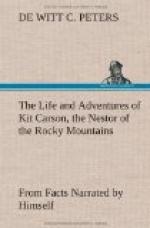provide for their animals. The second was to
prepare their arms. As soon as it would do for
them to move, they started, eager for the strife.
It was judged best first to make a half circuit and
then approach the Indians from the direction they
themselves were travelling, as from this source, they
wisely judged the red men would be less apprehensive
of an attack. Their movements were made slowly
and with great care in order not to alarm the savages.
Having obtained a position close enough to observe
the strength of their enemies, they stopped to reconnoitre.
The men then crept for a long distance on their hands
and knees until finally they obtained a full view
of the Indians, which showed them that the savages
had erected two rough forts and that they were now
divided into two parties. A dance was in progress
in honor of the robbery so recently perpetrated, which
proved conclusively, that they were without even a
suspicion of danger. Just outside one of the
forts, the nine stolen animals were securely tied.
This sight did not tend to allay the wrath of the
trappers. They resolved that come what might
the attempt to regain their property and punish the
Indians should be made notwithstanding their strength.
To insure success in spite of their weakness, they
determined to conceal themselves and wait quietly
until the Indians had lain down for sleep. During
this time of suspense the trappers were subjected
to great suffering for the weather was intensely cold
and they possessed but a scanty allowance of clothing
fit for such work. But as there is an end to all
things, there was an end to the dance and other festivities
and the savages sought their rest. At last the
time for action arrived. Kit Carson and five
of his companions commenced crawling towards the stolen
horses, which, on reaching, were easily set free by
cutting their halters. They then threw snow-balls
at them and by this means drove them away without
disturbing the sleeping Indians. The trappers
who acted as a reserve party soon after joined Kit
and his companions; and, after retreating some distance
in order to be out of the hearing of the enemy, they
held a council to obtain the views of each member
of the party as to their next step. It appeared
that a difference of opinion existed; some of the
men were in favor of returning, having recovered their
property and sustained no damage. The remainder,
those who had lost no animals, wanted satisfaction
for the trouble and hardship they had undergone while
in pursuit of the thieves. Kit Carson and two
others composed this latter party and thus were determined
to punish the thieves, let the consequences of the
attempt be ever so fatal. The more peaceful party,
seeing this earnestness, could not do otherwise than
lend their aid in the fight and cheerfully did so.
There always existed such a feeling of brotherly love among the old trappers of the Rocky Mountains, that the hour of peril was never the hour for separation or desertion. This instance affords a fair example how the minority could easily rule the majority when the minority held to the side of danger. The whole band were now unanimous in favor of the attack.




